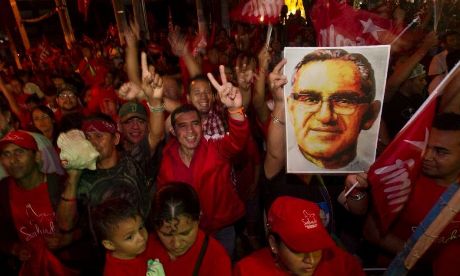A leading campaigner of the cause of Archbishop Oscar Romero believes the slain prelate was a martyr of the church of the Second Vatican Council.
The postulator of the archbishop’s cause, Archbishop Vincenzo Paglia, said that Romero’s killers wanted “to strike the Church that flowed from the Second Vatican Council”.
On February 3, Pope Francis formally recognised that the slain Salvadoran archbishop was killed “in hatred of the faith” and not for purely political reasons.
A right-wing death squad shot Archbishop Romero dead as he celebrated Mass on March 24, 1980.
This was one day after the archbishop gave a sermon calling on soldiers to stop enforcing the El Salvador government’s policies of oppression and violations of human rights.
Sources believe it is likely Archbishop Romero will be beatified within five months in El Salvador and will be canonised by 2017.
Archbishop Paglia said the two decades it took to obtain the decree of martyrdom were the result of “misunderstandings and preconceptions”.
During Archbishop Romero’s time as archbishop of San Salvador – from 1977 to 1980 – “kilos of letters against him arrived in Rome”.
“The accusations were simple: He’s political; he’s a follower of liberation theology.”
To the accusations that he supported liberation theology, Archbishop Paglia said, Archbishop Romero responded, “Yes, certainly”.
“But there are two theologies of liberation: one sees liberation only as material liberation; the other is that of Paul VI.
“I’m with Paul VI”, Archbishop Paglia indicated how Archbishop Romero would have responded, in seeking the material and spiritual liberation of all people.
All the complaints, Archbishop Paglia said, slowed the sainthood process and “strengthened his enemies”.
The Congregation for the Doctrine of the Faith examined all Romero’s homilies and writings and cleared them.
But the congregation, led by Cardinal Joseph Ratzinger (later Pope Benedict XVI) at the time, told the Congregation for Saints Causes that the process should be put on hold.
There were concerns about the use of Romero’s words for political ends and about being seen to endorse political forms of liberation theology.
But Pope Benedict XVI unblocked the process for Archbishop Romero’s cause in 2012, having earlier expressed support for his beatification in 2007.
Sources
